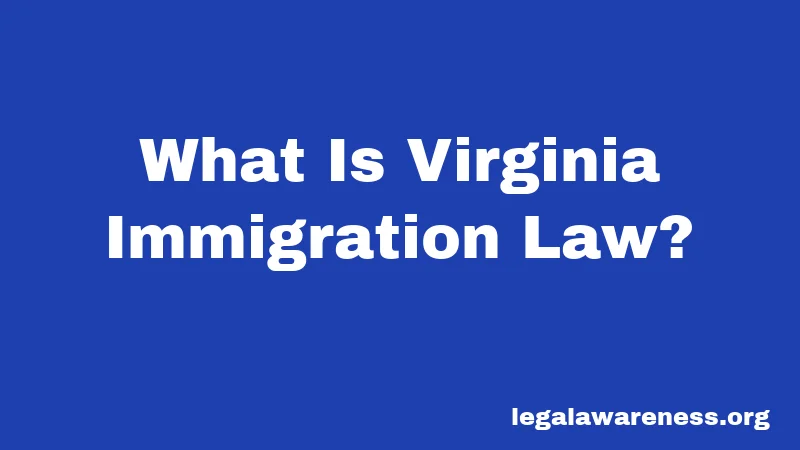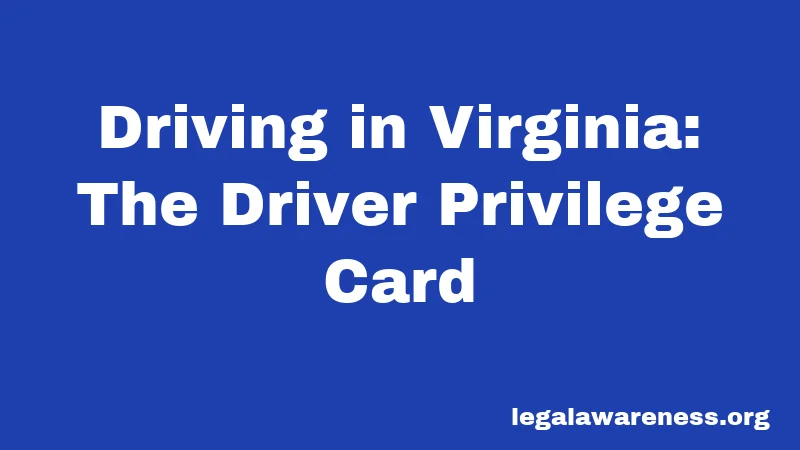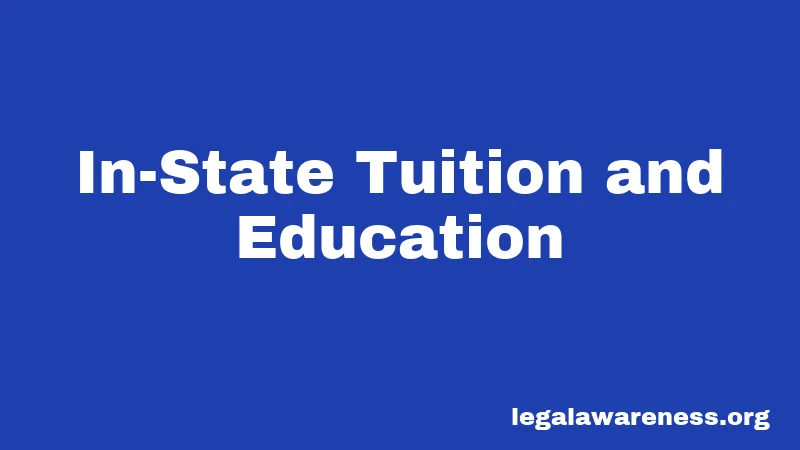Virginia Immigration Laws in 2026: What You Actually Need to Know
Most people have no idea how complex Virginia’s immigration rules actually are. And honestly, they change. A lot.
Here’s the thing: whether you live in Virginia or you’re planning a move there, understanding these laws matters. They affect where you can work, how you can drive, and what benefits you can access. Let’s break it down.
What Is Virginia Immigration Law?

Virginia, like all states, has to follow federal immigration rules. But Virginia also has its own state laws that add to those federal rules.
Think of it like this: federal law is the floor. Virginia can add extra rules on top if it wants. Some of Virginia’s rules help immigrants. Others make things stricter.
The big areas we need to talk about? Employment, driving, and public benefits. These are the things that actually affect your daily life.
Employment and Work Requirements in Virginia
E-Verify: What Virginia Requires
Okay, here’s where it gets important. Not all Virginia employers have to use E-Verify.
E-Verify is the government system that checks if someone can legally work in the U.S. It matches information from your I-9 form against records from Social Security and the Department of Homeland Security.
So here’s what Virginia actually requires: state agencies must use E-Verify for all new employees. Public contractors with more than 50 employees and contracts over $50,000 also have to use it.
Private employers? They’re not required to use E-Verify. They can if they want, but it’s voluntary for them.
If you’re applying for a job at a state agency or large government contractor, they’ll run you through E-Verify. Prepare for that.
What E-Verify Checks
E-Verify looks at your name, date of birth, and Social Security number. It verifies that the information on your I-9 form matches government records.
The system will give one of three results: employment authorized, tentative non-confirmation, or final non-confirmation.
Tentative non-confirmation means there’s a mismatch. You get a chance to fix it. This is important, so don’t ignore it if you get this notice.
Final non-confirmation means the verification failed. You and your employer need to talk about what to do next.
Driving in Virginia: The Driver Privilege Card

Stay with me here. This is actually one of Virginia’s best laws if you’re not a U.S. citizen.
In January 2021, Virginia created something pretty special: the Driver Privilege Card. It’s basically a driver’s license for non-U.S. citizens, including undocumented immigrants.
Think of it like a traffic ticket saver. Before this, undocumented immigrants had no legal way to drive. One traffic stop could lead to immigration trouble. Now? You can drive legally and avoid that risk.
Who Can Get a Driver Privilege Card?
You need to meet a few requirements. First, you must be a non-U.S. citizen who lives in Virginia.
You also need to have reported income from Virginia sources in the past 12 months. Or you need to be claimed as a dependent on someone’s Virginia tax return.
Your driving privileges can’t be suspended or revoked in Virginia or any other state. And you can’t have any insurance-related infractions.
That’s it. Immigration status? Doesn’t matter. Virginia doesn’t ask about it.
How to Get Your Driver Privilege Card
The process is almost exactly like getting a regular driver’s license.
First, fill out Form DL10 (the driver and identification privilege card application). You’ll do this either before your appointment or during it.
Next, gather your documents. You’ll need proof of residency and a tax document showing you reported income in Virginia. If you have a Social Security number, bring that. If not, bring an Individual Taxpayer Identification Number (ITIN).
You’ll take a vision test. Most people pass this easily.
Then comes the knowledge test. You’ll answer questions about Virginia traffic laws and road signs. If you’ve never held a driver’s license before, you must pass this written test.
The fee is $53. You’ll need an appointment at your local DMV to apply.
The whole process takes a few weeks. Once approved, you’ll get your card in the mail.
What You Can’t Do With a Driver Privilege Card
Here’s what’s important: the card is NOT REAL ID compliant. You can’t use it to board an airplane or enter federal buildings.
You also can’t apply for a commercial driver’s license with it. No big rigs or delivery trucks for commercial purposes.
But for regular driving on Virginia roads? You’re fully legal.
Immigration Enforcement in Virginia
Hold on, this part matters. Virginia’s law enforcement has gotten more involved in immigration enforcement in 2025.
In February 2025, Governor Glenn Youngkin signed Executive Order 47. This directs Virginia State Police and the Department of Corrections to sign Section 287(g) agreements with Immigration and Customs Enforcement (ICE).
What does that mean? It means Virginia state police can be trained to help ICE enforce federal immigration law.
This creates what’s called the “287(g) VSP Task Force.” Officers trained under this program can help identify and process immigrants without legal status who are arrested for crimes.
One county, Culpeper County, already participates in this program through its sheriff’s office.
This doesn’t mean police randomly stop you to ask about immigration status. But if you’re arrested for a crime, immigration enforcement becomes part of what happens.
What This Means for You
If you’re stopped for a traffic violation, officers will still follow the same rules. They can’t pull you over just because of your immigration status.
But if you’re arrested for a criminal offense, that’s different. Law enforcement will likely check your immigration status.
Here’s the key: if you’re arrested and undocumented, you could be transferred to ICE custody and face deportation proceedings.
This is why the Driver Privilege Card matters. A legal driver’s license reduces traffic stops and the risk of contact with law enforcement.
In-State Tuition and Education

Confused about college costs for undocumented students? You’re not alone.
Virginia does allow undocumented students to pay in-state tuition at colleges and universities. This happened because of Senate Bill 1387, which took effect in July 2020.
But here’s what’s happening: in late 2025, the U.S. Department of Justice filed a lawsuit against Virginia. The Trump administration argues this violates federal law.
The case is still active. The outcome could change whether undocumented students can access in-state tuition in the future.
Who Currently Qualifies
Right now, to get in-state tuition, you must meet these requirements. First, you need to have attended high school in Virginia for at least two years.
You must have graduated from a Virginia high school on or after July 1, 2008. Or you must meet other criteria showing substantial Virginia ties.
You also need to provide tax return documentation from your parents or guardians.
DACA recipients (Deferred Action for Childhood Arrivals) also qualify for in-state tuition in Virginia.
The in-state tuition savings are huge. At the University of Virginia, for example, in-state tuition is about $24,000 per year. Out-of-state tuition is over $62,000.
But given the federal lawsuit, students should watch for updates. This benefit might not last forever.
Public Benefits and Healthcare
Not sure what benefits you can access? Let me break it down.
Medicaid rules depend on your immigration status. Undocumented immigrants have limited access. But Virginia does cover emergency medical services for undocumented people.
Updated rules in 2025 expanded Medicaid coverage for pregnant women, regardless of immigration status. This is huge for maternal health.
SNAP (food stamps) is mostly not available to undocumented immigrants. Same with cash assistance programs.
Lawfully present immigrants have better access to these programs. But there are waiting periods and eligibility rules.
Here’s something that matters: a bill has been proposed that would require social services to ask about immigration status when people apply for benefits. This hasn’t passed yet, but it’s being discussed.
If this bill becomes law, it could discourage immigrants from applying for benefits they actually qualify for.
The best move? Contact an immigration attorney or a legal aid organization before applying for any benefits. They can tell you exactly what you’re eligible for.
Rights and Protections in Virginia
Okay, pause. Read this carefully.
You have rights, regardless of immigration status. Law enforcement can’t search your home without a warrant. They can’t search your phone or laptop without your permission.
You have the right to remain silent. You don’t have to answer questions about where you were born or how you entered the country.
If you’re arrested, you have the right to an attorney. Tell police you want a lawyer, and don’t answer more questions until one is present.
These rights apply to everyone in the U.S., documented or undocumented.
Recent Changes and What’s Coming
Trust me, Virginia’s immigration landscape is shifting. Executive Order 47 was a major change in 2025.
The federal lawsuit about in-state tuition is ongoing. The Trump administration is pushing hard on this.
Some Virginia lawmakers are considering bills that would require immigration status checks for public benefits.
Others are working to expand healthcare access for undocumented immigrants.
Stay informed. Laws can change year to year, sometimes even faster than that.
How to Get Help
You’re not alone. Virginia has resources.
Virginia Poverty Law Center provides legal help and information about immigrants’ rights. They have advocates who understand both Virginia and federal law.
Legal Aid Justice Center offers free legal services to income-eligible immigrants. They help with driver privilege cards, benefits applications, and emergency planning.
Virginia Coalition for Immigrant Rights is a community organization that advocates for immigrant rights and provides support.
USCIS and Immigration.gov have official information about federal immigration law and processes.
Many lawyers in Virginia specialize in immigration law. Get a consultation if you’re facing complex issues like deportation threats or visa applications.
Frequently Asked Questions
Can I get a Driver Privilege Card if I’ve been arrested before?
Yes, as long as your driving privileges aren’t currently suspended or revoked. A past arrest doesn’t disqualify you. But some convictions might. Check with the DMV.
Will applying for a Driver Privilege Card expose my immigration status?
No. Immigration status is irrelevant to the application. The DMV doesn’t report your status to immigration authorities.
Can I be deported if police stop me for speeding?
A regular traffic stop won’t lead to deportation. But if you’re arrested for a crime, immigration enforcement becomes involved. That’s when deportation becomes possible.
Can my employer require E-Verify if they’re not required to?
Yes. Private employers can voluntarily use E-Verify even though it’s not required in Virginia. Ask your employer about their policies.
What happens if the lawsuit against Virginia’s in-state tuition law wins?
If the federal government wins, Virginia would likely stop offering in-state tuition to undocumented students. Students already enrolled might be grandfathered in, but this isn’t guaranteed.
Final Thoughts
You now know the basics of Virginia immigration law. Immigration is complicated, but you’ve got this.
Remember: laws change. What’s true today might be different next year.
Keep yourself informed. Connect with legal resources when you need them. Know your rights.
And seriously, if you’re undocumented and living in Virginia, get that Driver Privilege Card. It’s one of the smartest moves you can make.
Need more help? Reach out to the organizations listed above. They want to assist you, and many services are free.
Stay safe, stay informed, and don’t hesitate to ask for help when you need it.
References
- Virginia Department of Motor Vehicles – Driver Privilege Card: https://www.dmv.virginia.gov/licenses-ids/license/driver-privilege-card
- Virginia Code § 2.2-4308.2 – E-Verify Requirements: https://law.lis.virginia.gov/vacode/title2.2/chapter43/section2.2-4308.2/
- Virginia Poverty Law Center – Immigration Rights and Resources: https://vplc.org/immigration-rights-and-resources/
- Governor’s Office – Executive Order 47 on Immigration Enforcement: https://www.governor.virginia.gov/newsroom/news-releases/2025/february/
- USCIS E-Verify Program: https://www.e-verify.gov/
- Higher Ed Immigration Portal – Virginia: https://www.higheredimmigrationportal.org/state/virginia/
- Legal Aid Justice Center: https://www.lajc.org/
- Virginia Coalition for Immigrant Rights: https://www.vcirvotes.org/
- U.S. Department of Homeland Security – I-9 and Employment Eligibility Verification: https://www.uscis.gov/i-9
